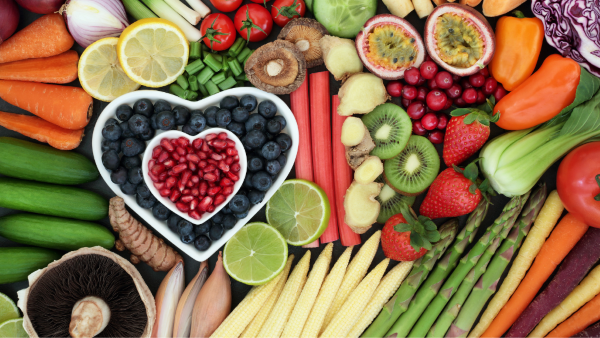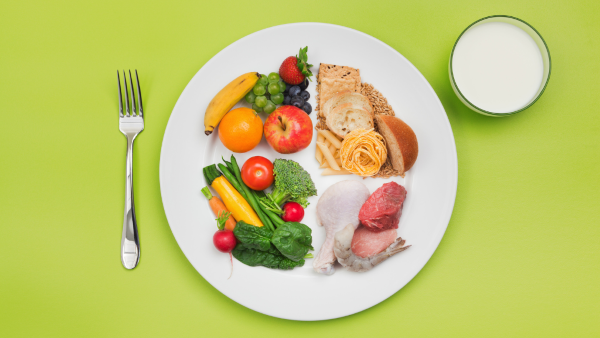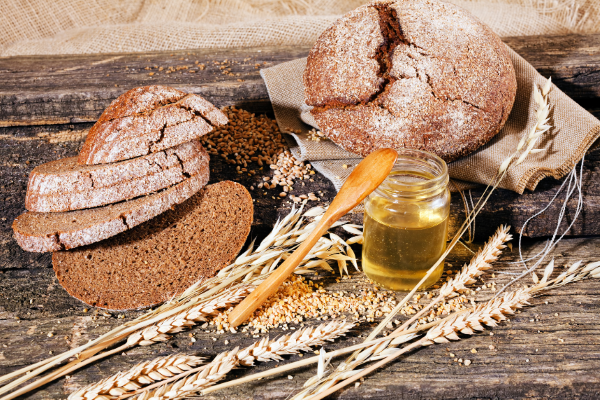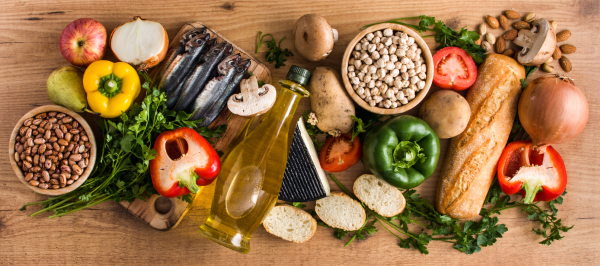Our diet and the food we eat impact both our cholesterol levels and cardiovascular health. Making small changes to your diet can help you to take steps towards preventing heart disease and keeping your heart healthy. We’ve picked some tips on how you can eat healthy for a healthy heart.
Heart disease prevention

The most effective way to try and prevent heart disease is to make lifestyle changes. Eating a balanced diet, getting regular exercise, not smoking, and keeping your blood pressure at a healthy level, will all help minimise your risk of a heart attack.
High blood pressure can increase the intensity of hypertension headaches. Find out more about the different types of headaches.
A diet high in saturated fat, salt, and sugar increases the risk of heart disease and stroke. To minimise the risk, it is recommended you eat a balanced diet that provides your body with sufficient minerals. Maintaining a healthy body weight can also help minimise your risk.
Diets high in saturated fats can lead to fatty deposits building up inside your arteries, alongside the hardening of your arteries. This is known as atherosclerosis. When arteries become hardened and clogged, it restricts blood flow, which limits the flow of oxygen and nutrients in your body.
Restricted blood flow also limits the removal of carbon dioxide and other waste products from your cells that has entered the bloodstream. Deoxygenated blood is much darker compared to oxygenated blood.
Diets that are high in fat lead to fatty plaque building up inside your arteries as these foods contain bad cholesterol, or low-density lipoprotein (LDL). These foods are also high in saturated fat, which increases the LDL levels in your blood.
Find out more about cholesterol and the importance of lowering cholesterol levels.
Tips for eating healthy

Now we’ve covered the importance of eating healthy for a healthy heart, it’s time to dive into the tips for how you can change your diet. Starting with small changes and building up to bigger changes can help you to stick to a healthier diet. Let’s take a look…
5 a day

5 a day is something many will already be aware of. We should eat 5 fruit and vegetables a day to stay healthy. The NHS recommends that we should eat 5 portions of fruit and veg each day to minimise the risk of heart disease, stroke, diabetes, and cancer.
Fitting 5 a day into your diet is a lot easier than people realise. 1 of your 5 a day includes:
- 80g of fresh, canned, or frozen fruit and veg. Canned fruit and veg with natural juice or water is better. Eating a variety of fruit and veg can provide you with plenty of minerals and vitamins.
- 30g of dried fruit. Dried fruit should be eaten at mealtimes rather than separately to reduce tooth decay.
- 150ml of fruit juice or vegetable smoothie. You should limit the intake of fruit juices and smoothies as these contain sugars that can cause tooth decay. Drinking these at mealtimes is recommended as opposed to on their own.
- 80g of pulses and beans. These only count as 1 of your 5 a day regardless of how many you eat in a day.
Potatoes do not count as one of your 5 a day as these are a starchy food. Sweet potato is a vegetable that does count as 1 of your 5 a day.
Too much, too late
Portion sizes are something many people won’t consider when it comes to eating. You may be surprised to find that portion sizes can affect heart health. Studies have shown that eating high-calorie foods, especially after 6 pm, increases your risk of diabetes and high blood pressure.
Another incentive for minimising your food intake in the evening is better sleep. Eating too much, or too late, increases the chance of heartburn and indigestion, making it harder for us to get to sleep. Overeating can also lead to obesity, which increases your risk of heart disease and diabetes.
Check out these tips for how to better control and manage portion sizes.
Get the balance right

Not only is portion size important, but so too is the right balance of food in our diets. For our bodies to get all the nutrients it needs, we need to eat a balanced diet:
- At least 5 fruit and veg each day
- Starch-based foods, such as bread, pasta, potato, and rice
- Some milk and dairy-based products
- Sources of protein, such as meat, eggs, fish, and beans
- A tiny amount of high fat/sugar foods or drinks
Within a balanced diet, you need to ensure that you:
- Minimise the intake of saturated fat as tempting as they may be (and choose the healthier unsaturated fat instead)
- Reducing salt intake (as too much can increase our blood pressure)
- Stick within the recommended guidelines for alcohol
- Choosing whole grains over refined grains (such as white bread, biscuits, white flour, cakes, pies, etc.)
Cutting down the saturated fats

We’ve also touched upon this already, but given its importance to maintaining a healthy heart, it deserves its own mention. Foods high in saturated fats provide little nutritional value and can lead to a higher risk of heart disease.
Here are the fats you should prioritise:
- Olive oil
- Vegetable and nut oils
- Avocados
- Cholesterol-lowering margarine
- Seeds and nuts
And the ones you should limit:
- Butter and lard
- Bacon fat
- Creamy sauces
- Chocolate and cocoa butter
- Coconut oil
- Margarine and cream
You should also try to choose low-fat protein options too as part of a balanced diet. High-fat proteins include full-fat dairy products, fried meats (such as sausages), organ meats (such as liver), and spareribs.
Instead, you should try to eat these low-fat proteins:
- Eggs
- Low-fat dairy
- Fish (especially cold-water fish such as salmon)
- Skinless poultry (white meat)
- Soy-based products
Grains, and wheat, and starch

Another healthy eating tip for a healthy heart is to make sure you eat grain and starch foods as part of a balanced diet. These foods are a source of carbohydrates, providing slow-release energy for your brain and body.
These foods provide a sustained energy release making them much more healthy compared to quick energy foods, such as sugar. They also help to keep you fuller for longer and reduce the risk of heart disease.
Some foods rich in grains and starch to consider include:
- Oats and barley
- Brown rice
- Wholemeal pasta and bread
- Wholemeal or fortified breakfast cereals
The Mediterranean way

Mediterranean countries have a specific diet that is high in fish, vegetables, bread, nuts, grains, and olive oil. All these foods are healthy and are considered a healthy way of eating. Mediterranean countries also eat very little meat.
People living in Mediterranean countries experience much less heart disease compared to the UK and Northern Europe. The diet is considered the reason for this. Mediterranean countries, such as Greece, Italy, and France, also have higher life expectancies compared to other European countries.
There are many changes you can make to start eating a more Mediterranean style diet. These include:
- Eating more plant-based foods, such as fruit and vegetables (this can include fresh, frozen, or canned).
- Cutting down your meat intake (especially red meat)
- Drinking less alcohol
- Eating more oily fish and seafood
- Switching white bread to a wholemeal/seeded alternative
- Changing to wholemeal cereals
- Eating more seeds, nuts, and pulses (such as lentils)
- Adding herbs and spices to meals can also be beneficial
There are many reasons why the Mediterranean diet is very healthy. Reasons include:
- A low-fat intake
- High monounsaturated fats
- Good sources of Omega 3
- Foods are rich in fibre and potassium
- More vitamins E and C, which are antioxidants
Find out more about how you can start switching to a Mediterranean diet.
Making small changes to your diet can help you on your way to a healthy heart. Begin by making small and manageable changes that you are likely to stick to. Then you can build up towards making bigger dietary changes. Not only will your heart thank you, but you’ll feel better too!

